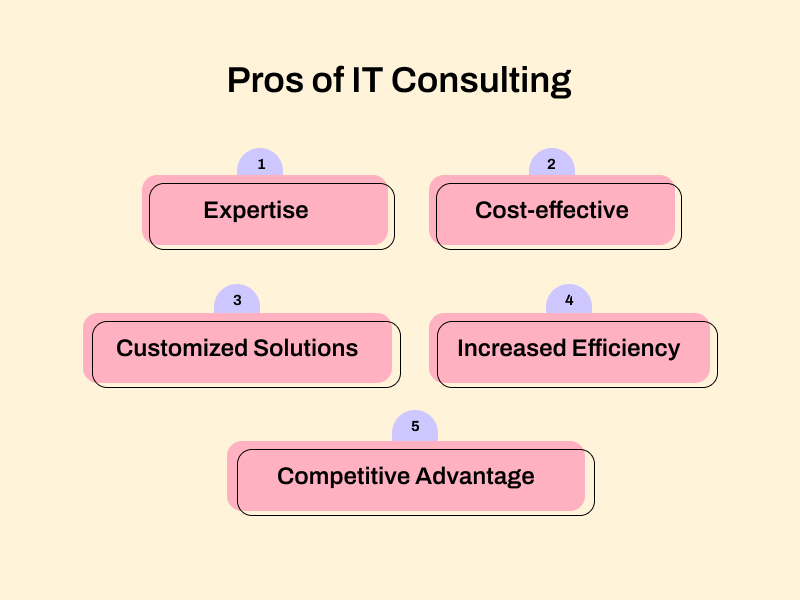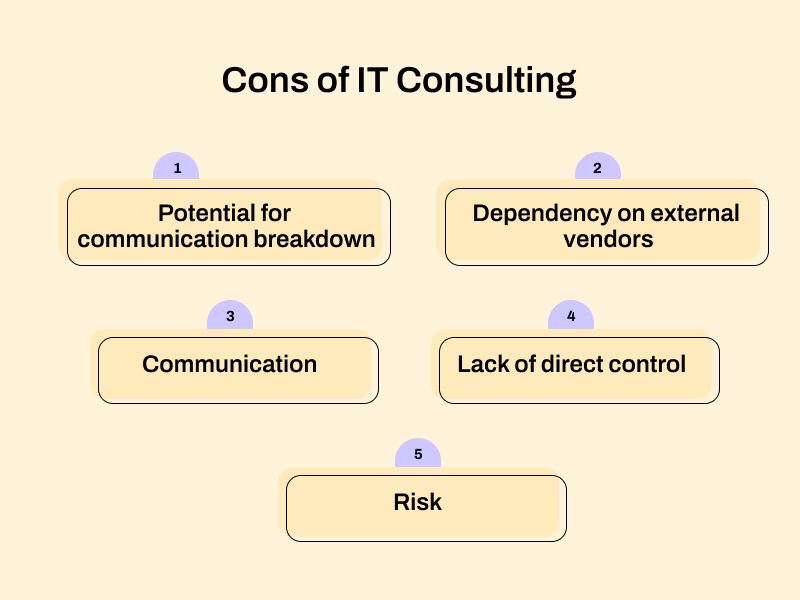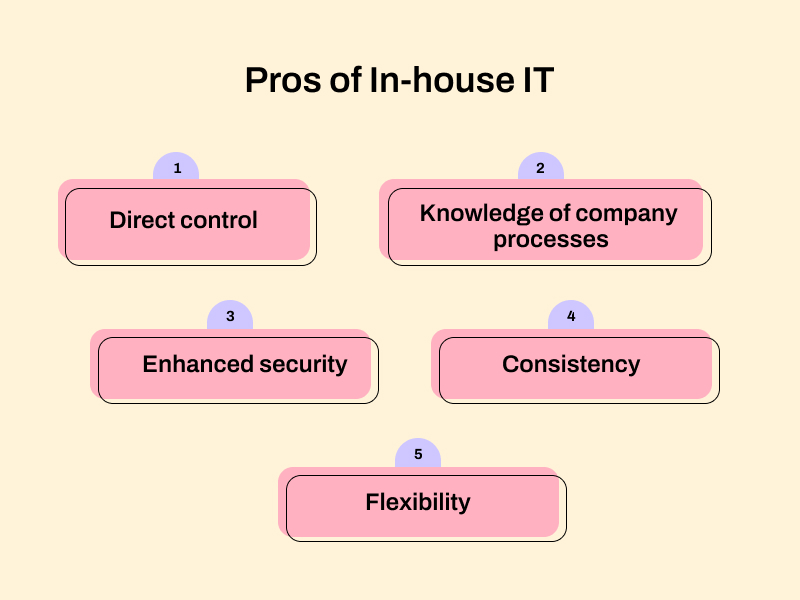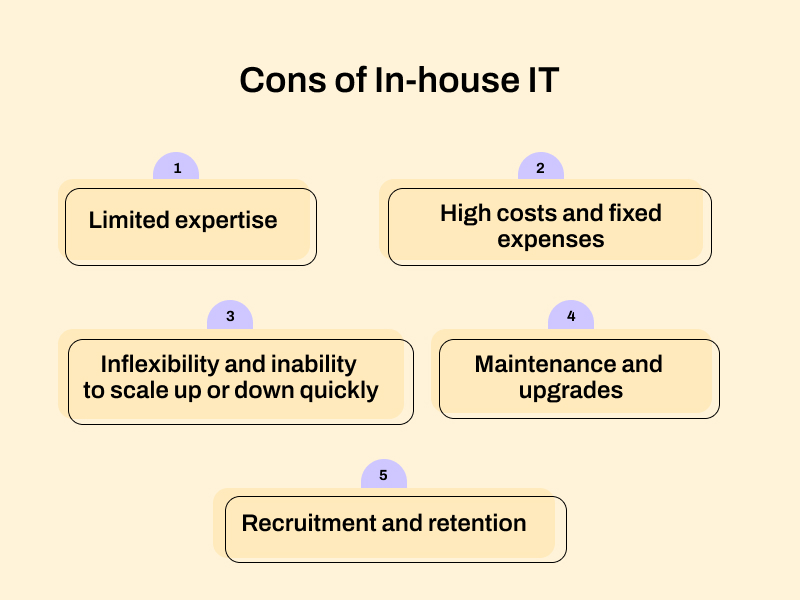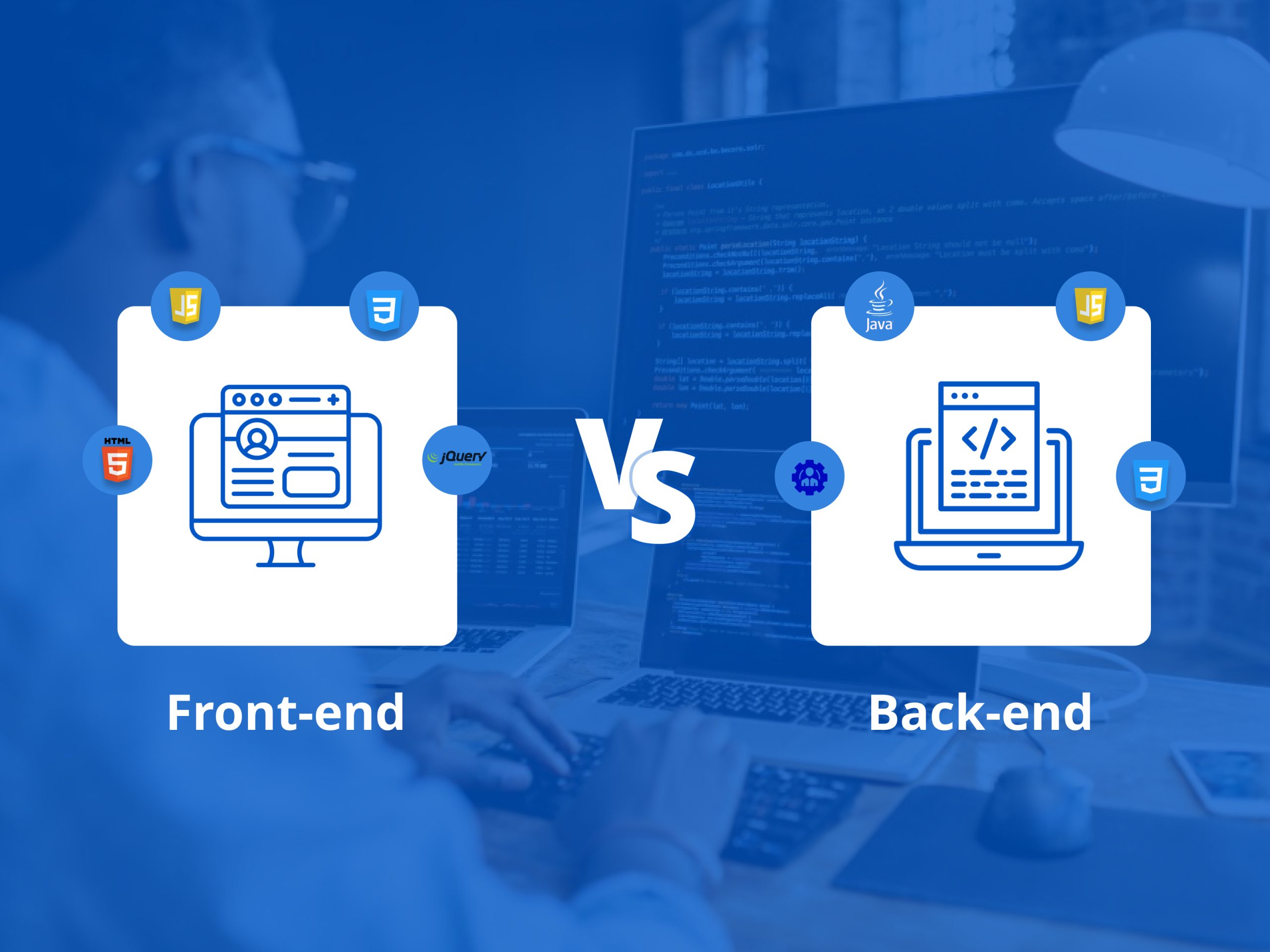Wondering which IT path to take between IT consulting and an in-house IT team for your business?
It’s a decision that can shape the future of your technology journey. Imagine two paths diverging in the tech-infused woods – one leading to external IT experts, the other to an in-house IT crew. Which road should you take?
This choice is crucial in the digital age, where technology is the backbone of business. IT consulting brings external specialists with diverse skills and experiences, while in-house teams offer familiarity and full-time commitment.
The balance between these options can be a make-or-break factor for your business’s success.
In this guide, we’ll navigate the pros and cons of IT consulting and in-house IT, helping you make an informed choice that aligns with your business goals.
Table of Contents
IT Consulting – An Overview
The increasing size of the IT consulting market in the US is a clear indication of how essential technology has become for businesses.
IT consultants have the required knowledge and skills to help businesses develop and implement effective IT strategies, streamline their technology infrastructure, and optimize their IT investments.
Businesses turn to IT consultants for:
- Technology strategy development
- Software and hardware implementation
- Cybersecurity assessments
- Cloud computing solutions
- Data management and analysis
- Project management
Do you know? According to the research, the IT Consulting & Implementation industry will generate revenue of US$65.36 billion by 2023.
Get in Touch with PixelCrayons Experts Today
Pros of IT Consulting
- Expertise: Outsourcing IT tasks to high-value specialists who work in the market daily, use the most relevant metrics, and pursue continuing education in their fields can provide businesses with access to expertise that they may not have in-house.
- Cost-effective: Hiring IT consultants can be more cost-effective than hiring a full-time IT staff, especially for small and medium-sized businesses. By hiring consultants, they do not have to take care of all the necessary infrastructure, including hardware, software, and office space.
- Customized solutions: IT consultants work with clients to understand their unique business requirements and develop customized solutions that meet their specific needs.
- Increased efficiency: By leveraging technology and optimizing IT processes, IT consultants can help businesses improve efficiency, reduce downtime, and increase productivity.
- Competitive advantage: Working with an IT consultant can help businesses gain a competitive advantage by leveraging the latest technology to improve operations, enhance security, and stay ahead of the competition.
Cons of IT Consulting
- Potential for communication breakdown: If there is a lack of clear communication or understanding between the IT consultant and the business, a communication breakdown can happen.
- Dependency on external vendors: IT consultants may rely on external vendors for hardware, software, and other services, which can lead to delays, dependencies, and potential conflicts of interest.
- Communication: Communication can be challenging if the IT consultant is not able to effectively communicate technical concepts to non-technical stakeholders.
- Lack of direct control: Since IT consultants are external contractors, businesses may have limited control over their work, priorities, and decision-making.
- Risk: Working with an IT consultant can lead to security for the business, such as data breaches or security vulnerabilities if the consultant does not have adequate security measures in place.
Also Read: Finally Revealed: Top Business Benefits of IT Consulting Services
In-House IT – An Overview
In-house IT refers to the use of internal staff and resources to manage a company’s information technology systems and services.
It means that the company employs its own IT staff to handle tasks such as hardware and software installation, network management, cybersecurity, and user support.
In-house IT allows companies to have direct control over their technology infrastructure and operations. It also enables closer collaboration between IT staff and other departments within the organization.
However, in-house IT can be costly and may require significant investment in equipment, training, and ongoing maintenance and support.
Pros of In-house IT
- Direct control: With in-house IT, businesses have direct control over their IT operations, allowing them to make decisions and implement changes quickly and efficiently.
- Knowledge of company processes: They have a better understanding of the company’s processes and culture, which can help them develop IT solutions aligned with the business’s goals and objectives.
- Enhanced security: In-house IT staff can implement and maintain robust security measures to protect the company’s data and information, which can be especially important for businesses that deal with sensitive data.
- Consistency: In-house IT staff can provide consistent support and service, which can lead to higher user satisfaction and fewer disruptions to business operations.
- Flexibility: In-house IT staff can be more flexible and responsive to changing business needs and requirements, which can help businesses adapt to evolving technology trends and stay ahead of the competition.
Cons of In-house IT
- Limited expertise: In-house IT staff may have limited expertise in certain areas, leading to delays or inadequate solutions to complex IT problems.
- High costs and fixed expenses: Maintaining an in-house IT department can be expensive, with fixed costs such as salaries, benefits, and equipment.
- Inflexibility and inability to scale up or down quickly: In-house IT departments may lack the flexibility to quickly scale up or down based on changing business needs or project requirements.
- Maintenance and upgrades: IT departments are responsible for maintaining and upgrading hardware and software, which can be time-consuming and costly.
- Recruitment and retention: Finding and retaining skilled IT staff can be challenging, leading to high turnover rates and disruptions to IT operations.
IT Consulting Vs. In-house IT – A Comparison Based On Different Parameters
Let’s look at some of the comparison criteria that can help businesses decide between IT consulting services and an in-house IT team.
-
Cost Comparison
IT consulting can be more cost-effective than maintaining an in-house IT department, especially for small and medium-sized businesses. The consultants typically work on a project basis, meaning businesses only pay for the specific services they require.
In contrast, in-house IT departments have fixed costs such as salaries, benefits, and equipment that can be expensive.
-
Expertise & Skills Comparison
IT consulting offers businesses access to a wide range of specialized expertise and skills that may not be available in-house. The consultants stay up-to-date with the latest technological advancements, industry trends, and best practices, ensuring that businesses receive expert advice and guidance.
Whereas, in-house IT staff may have limited expertise in certain areas, leading to delays or inadequate solutions to complex IT problems.
Therefore, many companies turn to IT staff augmentation services to fill temporary skill gaps or increase capacity during busy periods.
-
Flexibility & Scalability Comparison
IT consulting services can be customized according to the changing needs of the business. Businesses can engage IT consultants for specific projects or for ongoing support as needed.
On the other hand, scaling up the in-house IT department can be expensive and time-consuming, and scaling down can lead to layoffs and disruptions to IT operations.
-
Control & Accountability Comparison
In-house IT departments are more closely aligned with the company’s goals and priorities, making it easier for them to work within the company’s culture and processes. They are also more accountable for their actions, as they are directly employed by the company.
IT consulting firms, on the other hand, may have a more difficult time integrating with a company’s culture and processes. They may also have less accountability for their actions, as they are not directly employed by the company.
How Can PixelCrayons Help?
Whether you are a startup or an enterprise business, PixelCrayons, a leading IT consulting and outsourcing company can help you in a number of ways:
Expertise
Our team of experienced IT consultants and developers can provide expert advice and guidance to startups on a range of IT-related issues, including software development, web development, mobile app development, and digital marketing.
Customized Solutions
We understand unique business requirements and develop customized solutions that meet their specific needs. The experts provide tailor-made solutions to startups based on their budgets and business objectives.
Cost-effective Services
PixelCrayons provides cost-effective services to startups, allowing them to save on IT costs without compromising on quality or performance.
Scalability
Our dedicated software development team provides scalable IT solutions that can grow with startups as their business expands. We have a flexible and scalable approach to IT outsourcing and consulting services.
Quality Assurance
Our team follows a rigorous quality assurance process to ensure the quality and reliability of the services. The team of dedicated QA professionals tests and verifies every project to ensure that it meets the highest standards.
Also Read: The Better Choice: In-House Development vs. Software Outsourcing?
The Final Say
When it comes to deciding between IT consulting and in-house IT teams, it ultimately depends on the specific needs of your business. In-house IT teams can offer more control and customization but may be more expensive and difficult to manage.
Meanwhile, IT consulting can offer quick and cost-effective solutions but may lack the control of an in-house team.
It’s important to consider the long-term effects of each option, as well as the short-term costs and convenience.
If you want to develop custom software for your business and lack in-house expertise, you can hire software developers with the necessary skills and expertise from the best IT Companies.
Get in touch with PixelCrayons professionals for all your project needs
Frequently Asked Questions
1. What are the advantages and disadvantages of an in-house IT team?
Advantages:
- Greater control over IT operations
- In-depth knowledge of the company’s technology and processes
- Direct management and oversight of IT staff
- More easily integrated with other departments
- Potentially greater job security for IT staff
Disadvantages:
- Higher costs and fixed expenses
- Limited expertise in certain areas
- Lack of flexibility and scalability
- Maintenance and upgrades can be time-consuming and costly
- Recruitment and retention of skilled IT staff can be challenging
2. Which is better having an in-house IT team or outsourcing the project to an IT consulting services provider?
The decision to use in-house or outsourcing services depends on the specific needs and resources of a company. In-house IT provides greater control and direct management of IT staff but can be expensive and lack flexibility. Outsourcing IT services can be cost-effective and provide access to specialized expertise, but may result in reduced control over operations and potential communication challenges.
3. Why would a company decide to outsource versus make IT in-house?
A company may decide to outsource IT services if they do not have the resources or expertise to handle the services in-house. Outsourcing can be cost-effective and provide access to specialized expertise, allowing a company to focus on its core business objectives. Additionally, outsourcing can provide greater flexibility and scalability than in-house IT.
4. What are the pros and cons of outsourcing IT requirements to a service provider?
Pros:
- Cost-effective
- Access to specialized expertise
- Greater flexibility and scalability
- Reduced need for recruitment and training of IT staff
- Ability to focus on core business objectives
Cons:
- Reduced control over IT operations
- Potential communication challenges with an outsourcing provider
- Dependence on outsourcing providers for quality and reliability
- Potential risks to data security and confidentiality
- Difficulty in integrating outsourced services with other departments.




